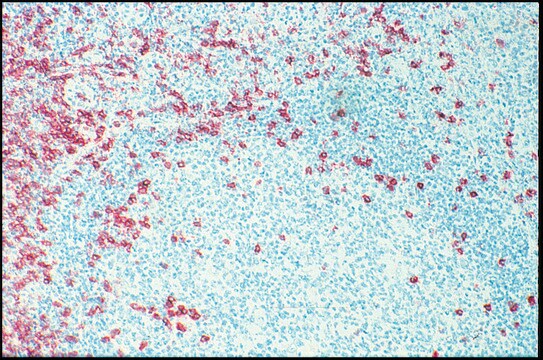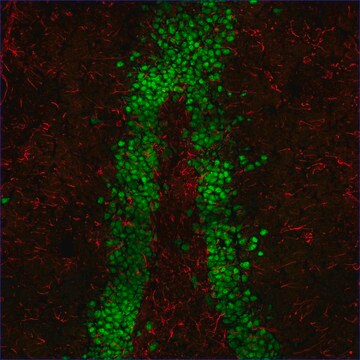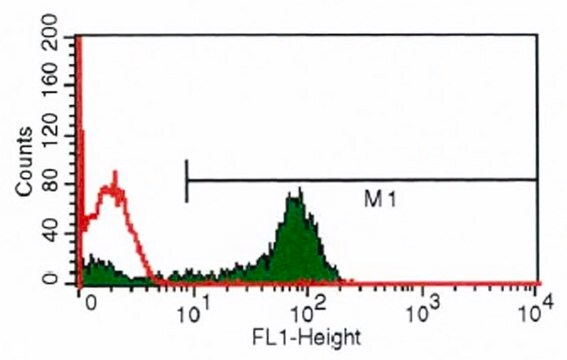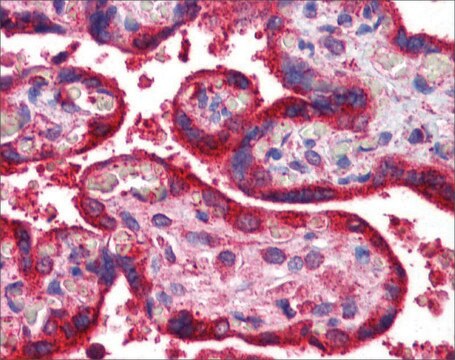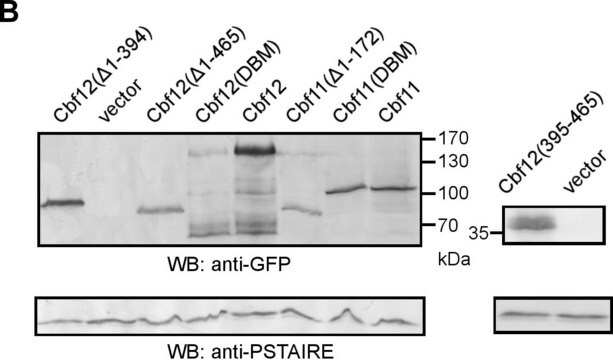SAB4700084
Monoclonal Anti-CD8 antibody produced in mouse
clone MEM-31, purified immunoglobulin, buffered aqueous solution
Sign Into View Organizational & Contract Pricing
All Photos(1)
About This Item
UNSPSC Code:
12352203
NACRES:
NA.41
Recommended Products
biological source
mouse
Quality Level
conjugate
unconjugated
antibody form
purified immunoglobulin
antibody product type
primary antibodies
clone
MEM-31, monoclonal
form
buffered aqueous solution
species reactivity
human
concentration
1 mg/mL
technique(s)
flow cytometry: suitable
isotype
IgG2a
NCBI accession no.
shipped in
wet ice
storage temp.
2-8°C
target post-translational modification
unmodified
Gene Information
human ... CD8(925)
General description
The antibody MEM-31 recognizes a conformationally-dependent epitope of CD8, a cell surface glycoprotein found on most cytotoxic T lymphocytes that mediates efficient cell-cell interactions within the immune system. CD8 is a disulfide-linked dimer and exists as a CD8 alpha/alpha homodimer or CD8 alpha/beta heterodimer (each monomer approx. 32-34 kDa).
Immunogen
Crude thymus membrane fraction
Application
The reagent is designed for Flow Cytometry analysis. Suggested working dilution for Flow Cytometry is 1 μg/mL of sample. Indicated dilution is recommended starting point for use of this product. Working concentrations should be determined by the investigator.
Features and Benefits
Evaluate our antibodies with complete peace of mind. If the antibody does not perform in your application, we will issue a full credit or replacement antibody. Learn more.
Physical form
Solution in phosphate buffered saline, pH 7.4, with 15 mM sodium azide.
Disclaimer
Unless otherwise stated in our catalog or other company documentation accompanying the product(s), our products are intended for research use only and are not to be used for any other purpose, which includes but is not limited to, unauthorized commercial uses, in vitro diagnostic uses, ex vivo or in vivo therapeutic uses or any type of consumption or application to humans or animals.
Not finding the right product?
Try our Product Selector Tool.
Storage Class Code
10 - Combustible liquids
Flash Point(F)
Not applicable
Flash Point(C)
Not applicable
Choose from one of the most recent versions:
Already Own This Product?
Find documentation for the products that you have recently purchased in the Document Library.
Tetsuhiro Kanazawa et al.
Clinical cancer research : an official journal of the American Association for Cancer Research, 20(19), 5075-5084 (2014-08-15)
Epstein-Barr virus (EBV) infects not only B cells but also T cells and natural killer (NK) cells, and T- and NK-cell lymphoproliferative diseases (T/NK-LPD) that are refractory to conventional chemotherapies may develop. To identify a molecular-targeted therapy for EBV-associated T/NK-LPDs
Netanya G Sandler et al.
The Journal of infectious diseases, 210(10), 1549-1554 (2014-05-28)
Abnormal levels of inflammation are associated with cardiovascular disease and mortality in human immunodeficiency virus (HIV)-infected patients. Microbial translocation, which may cause inflammation, is decreased by sevelamer in patients undergoing hemodialysis. In this single-arm study, we evaluated the effects of
Sae-Kyung Lee et al.
Clinical cancer research : an official journal of the American Association for Cancer Research, 20(13), 3485-3495 (2014-05-07)
The low immunogenicity of many cancer cells and the immunosuppression by various cancers and anticancer therapies have been an obstacle in the development of efficacious immunotherapies. Our goal was to test whether Toll-like receptor (TLR) agonists and anticancer chemotherapeutic agents
Yongjun Sui et al.
The Journal of clinical investigation, 124(6), 2538-2549 (2014-05-20)
Vaccines are largely evaluated for their ability to promote adaptive immunity, with little focus on the induction of negative immune regulators. Adjuvants facilitate and enhance vaccine-induced immune responses and have been explored for mediating protection against HIV. Using a regimen
Helena Janols et al.
Journal of leukocyte biology, 96(5), 685-693 (2014-06-15)
The causative microorganisms dictate the type of MDSC generated in sepsis patients, and a large proportion of PMN-MDSCs in gram-positive sepsis includes immunosuppressive myeloid blasts. MDSCs constitute a heterogeneous population of immature myeloid cells that potently suppress immune responses. They
Our team of scientists has experience in all areas of research including Life Science, Material Science, Chemical Synthesis, Chromatography, Analytical and many others.
Contact Technical Service